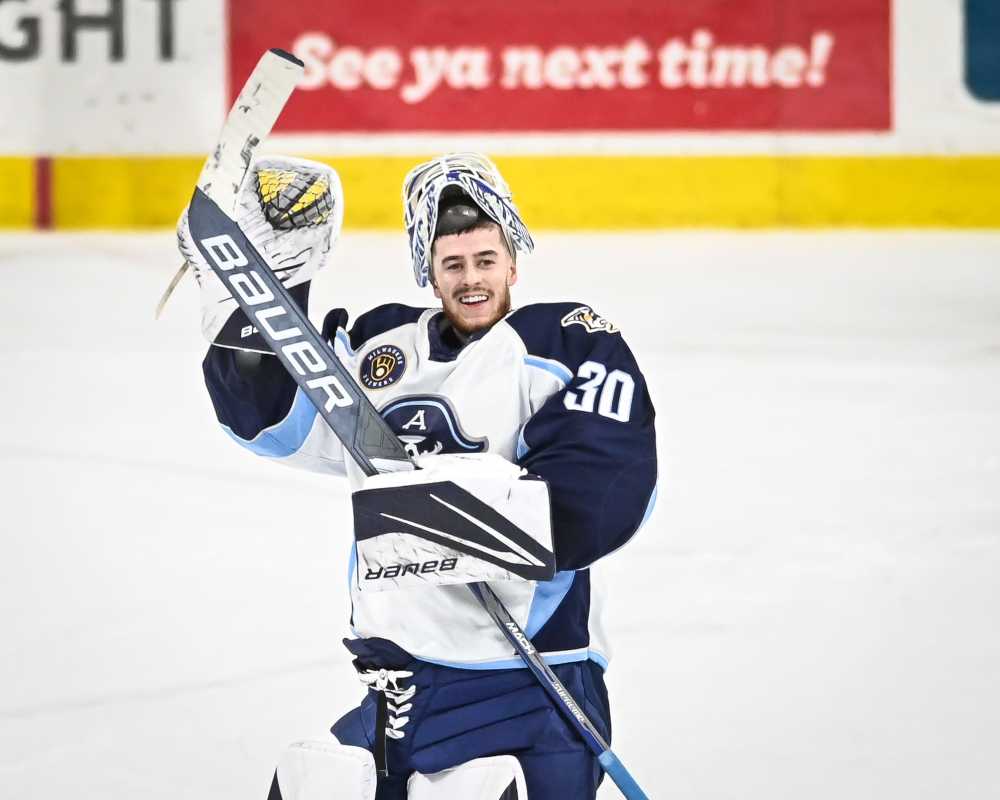Thanks to the reports surfacing that Yaroslav Askarov has informed the Nashville Predators that he will not report to camp and has formally asked for a trade, every NHL fan base will be creating their best fake trade proposals to bring the celebrated goaltending prospect to their favourite team.
Askarov was the 11th overall pick and the first goaltending selection of the same 2020 NHL Draft that netted the Senators Tim Stützle, Jake Sanderson and Ridly Greig in the first round.
At the time, Askarov was widely heralded as a potential top-10 selection based on his international success and his rare combination of size, athleticism and rebound control. Askarov won a bronze medal at the 2018-19 Hlinka Gretzky Cup and a silver at the U18 World Junior Championship, where he was named the tournament’s ‘Best Goaltender.’
The Russian goalie spent two seasons following his draft selection with the SKA St. Petersburg of the KHL and their VHL affiliate. He played sparingly across those two seasons, averaging 15 games per season between the two teams.
Askarov signed his three-year entry-level contract with the Predators after his 2021-22 campaign. He spent the next two seasons playing predominantly with their AHL affiliate in Milwaukee. In his first season with the Admirals, Askarov recorded a 26-16-5 record with a 2.69 goals against average and a save percentage of .911.
In 2023-24, Askarov improved upon those marks by posting a 30-13-1 record, a 2.39 goals against average and another .911 save percentage.
He turned 22 years old this past June, which makes his success at the AHL level all the more impressive. His age, pedigree, and professional experience will make Askarov a valuable commodity within NHL trade circles as teams, including the Predators, will assuredly project him to be a viable number-one goaltender in time.
Askarov has played in three NHL games over the last two seasons, but the Predators envisioned this day coming. Once they signed Juuse Saros to a long-term extension on July 1st, 2024 and moved quickly to ink veteran Scott Wedgewood to a two-year, $3 million contract of his own that same day, Askarov no longer had a clear path to an NHL job for the next two seasons. Understandably, Askarov made that formal request for a trade.
The Senators’ interest in Askarov dates back to his draft year. Rumours circulated that mercurial owner Eugene Melnyk tried to influence the organization’s decisions at the draft table.
One fun thing from behind the scenes. Eugene Melnyk used to follow my Twitter.
Leading up to the Askarov draft, I got a message from Mann asking if I could stop promoting the goalie, because Melnyk was pressuring them to draft him.
This stuff happened a lot over the years.
— Shawn Simpson (@TSPSimmerDown) November 6, 2023
Thankfully, the organization’s scouts won that battle and Jake Sanderson became a foundational building block.
It would make sense for the Senators to kick tires on Askarov.
General manager Steve Staios is characterized as a diligent executive, so at the very least, it is a given that he will see what kind of return the Predators would ask for. On a separate level, without a safely projectable number-one starter within their ranks, there is an organizational need for Askarov.
Linus Ullmark and Anton Forsberg are both 31 years old and in the last years of their deals. The Senators paid a significant opportunity cost to bring Ullmark into the fold this summer. Without any guarantee he signs an extension, a reality may exist where, without an extension in place, they are forced to move him at the deadline or lose him as an unrestricted free agent next summer.
If the Senators were to acquire Askarov, he would afford them more years of team control and add another building block to its young core. Unfortunately, for all the reasons I have outlined above, Askarov will be desirable for many organizations. The demand should cause the price to be high.
As the fifth-oldest team in the NHL, Nashville is trying to win now while in their competitive window, but they are fortunate in the sense that they still have a relatively well-regarded farm system. It might make sense for the Predators to prioritize young, NHL-ready talent. On the other hand, they may prefer to acquire draft capital that they can flip at the deadline to improve their roster or use themselves to bolster their system.
Unfortunately for the Senators, they are in a position where most of their best prospects have graduated to the parent level, meaning they will likely be less inclined to move any of its young core — especially when the status and effectiveness of Josh Norris are still clouded.
Including a goaltending prospect in Mads Sogaard in a prospective deal is a no-brainer, but the Predators would probably ask for Ridly Greig, Drake Batherson or Shane Pinto.
Even that kind of offer may need to be more competitive to beat a rival’s. Would such a move make sense?
In some other reality where the organization was not plagued by several years of poor drafting and significant trades that landed big names who moved on after a season, it might.
In this one, poor asset management during this rebuild left the organization with one of the thinnest farm systems in the league.
Considering how much draft capital the Senators have acquired since their last playoff appearance in 2017, it is a bitter pill to swallow, knowing that a rebuilding club likely does not have the flexibility or capital to pull the trigger.
Be sure to bookmark The Hockey News Ottawa for more great Senators coverage.
Related: Why Ottawa Senators Goalie Anton Forsberg May be Poised for a Bounceback Season
Related: Ottawa Senators Make Major Changes in Communications Department, Adding Local Hockey Journalists Ian Mendes and Sylvain St-Laurent
Related: Ottawa Senators: Shoring Up The Third Pair on Defence



